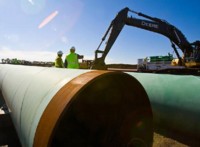US review to delay oil sands pipeline from Canada
 The
TheUnited States has called for further study on a planned
multibillion-dollar pipeline to import oil from Canadian tar sands
to the southern US Gulf coast, a move expected to delay the
project.
Backers of the Keystone XL pipeline project say the action will
unnecessarily push back approval at a time when the United States
desperately needs to increase its energy resources. But
environmentalists say the project has too many risks and is
unnecessary.
The US State Department said that it would seek public comment
on an additional environmental impact statement (EIS) for the
project, which will be made available in mid-April. The American
Petroleum Institute (API) called the announcement “unwelcome news”
that is likely to delay construction.
“This much-studied and much-needed pipeline would provide a
critical link to our largest energy supplier, Canada, and its vast
resources of nearby and available crude oil,” API president Jack
Gerard said. “It is past time for the administration to approve
this important infrastructure investment,” he added.

But Susan Casey-Lefkowitz, director of international programmes
at the Natural Resources Defense Council, dismissed the project as
unnecessary, saying: “The environmental and safety costs are too
high.”
Casey-Lefkowitz said that the nuclear calamity in Japan
highlights the need for domestic energy, but that the 2010 Gulf of
Mexico oil spill underscores the importance of clean energy
sources. “It’s ironic that when the oil spill happened in the Gulf,
the tar sands people were saying it is safe,” she said.
“But in truth, with the newest pipeline going across the
Ogallala Aquifer (which covers a wide area of the US central
plains), that could potentially contaminate freshwater resources
for about two million people.”
The NRDC, the Sierra Club and other groups issued a report last
month arguing that the pipeline would take the unrefined bitumen
from the oil sands and mix it with “volatile” natural gas
condensates, making spills likely.
The 2,673km pipeline would transport hundreds of thousands of
barrels per day of oil from Canada to the Texas coast as part of
the $12 billion Keystone pipeline system, one of the world’s
largest.
TransCanada Corporation, owner of the pipeline, which is also
backed by a number of other energy firms, said the State Department
announcement means the project “has now entered the final stages of
review.”
“We are confident we have addressed the major questions raised
by regulators and government agencies,” said Russ Girling,
TransCanada’s president and chief executive officer. “We expect a
final regulatory decision for this project by late 2011 and we are
pleased the Department of State has committed it will conclude its
review of Keystone XL by the end of the year

